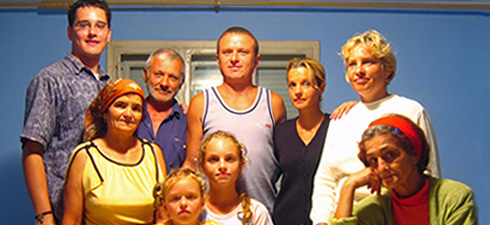“Back in the days of Ceaucescu,” say the nostalgic, “Romanians didn’t need welfare. Pensioners were rich and we’d never even heard of unemployment benefits because there was no unemployment." Plus begging was punishable by law, and young people received a job and the keys to a flat upon successful completion of their studies. Retirees got special holiday travel tickets, which can only be had nowadays by queuing up day and night in front of the administration offices. The "heroic mothers" who had produced plenty of progeny were also honoured with special benefits and medals.
But since the Iron Curtain was raised, Romania has become a veritable welfare paradox.
€1000 benefits
Despite the spectacular drop in the number of poor (from 8 million in 2000 to 1.5 million today, according to UNICEF), the ranks of social welfare beneficiaries have swelled. In 2008, no fewer than 11 million Romanians (out of a population of 21 million) received social security benefits. “This generosity may be blamed on populist politics, which determines how much money gets wasted,” says president Traian Basescu. Because in Romania benefits are granted not only to the disadvantaged segments of the population – pensioners, children, unemployed and minorities – but also to the rich.
The State is generous with maternity and paternity leave entitlements. Though far poorer than the major European powers, Romania grants 24 months’ paid maternity leave (or even 36 months to look after disabled children), with benefits at 85% of the parents’ average annual earnings, up to a €1000 monthly ceiling. France, in contrast, grants only 16 weeks’ paid leave, matching average earnings over the past 12 months. In Sweden, mothers get 16 months’ paid leave at 80% of their salaries. Romania’s "Moms Law”, which hasn’t always been that generous, got a significant boost during the 2008 election campaign.
As to benefits for children, the Romanian government helps foot the bill for the purchase of a computer, and the mayor hands newlyweds a €200 cheque for simply saying “I do”. What is more, since the 1st of July they are entitled to State-guaranteed loans to help them buy their first home.
Pensioners, a social contingent by and large left to their own devices over the past 20 years, are now emerging out of poverty thanks to repeated pension hikes that have been passed to woo voters. But Romania also has “special” retirees who still rake in several thousand euros a month: retired judges, MPs, police, military, diplomats and senior staff from Nicolae Ceaucescu’s Securitate forces. These interest groups have succeeded in pushing through legislation for monthly golden parachutes of €1000–€3000. The richest Romanian retiree is an ex-justice who draws a monthly retirement cheque of €8300.
This yawning gap between pension benefits is not the only cause for concern these days. The number of taxpayers is alarmingly scant compared to the total population of pensioners, with each of the gainfully employed carrying at least two retirees “on his back”. International financial organisations, moreover, recommend that the country up the retirement age to 63 for women and 65 for men by the year 2014 (as against 59 and 64, respectively, pro tem). But what to do when, according to the National Statistical Institute (INS), average life expectancy in Romania is 75 years for women and 68 for men? They should retire earlier, not later....
Jobless get short end of the stick
If Romania “beats” some highly developed EU countries by far in certain social disbursements, the same cannot be said of unemployment benefits. They are the lowest in the EU, averaging about €335 a month for a period of 15 months, according to the INS.
A study carried out by the labour ministry confirms that unemployment benefits here are far below those of our fellow European citizens for the same base wages. The explanation might lie in the fact that Romanian employers and employees are also pampered by the State: they only pay 0.5% of wages into the national unemployment fund….
Was this article useful? If so we are delighted!
It is freely available because we believe that the right to free and independent information is essential for democracy. But this right is not guaranteed forever, and independence comes at a cost. We need your support in order to continue publishing independent, multilingual news for all Europeans.
Discover our subscription offers and their exclusive benefits and become a member of our community now!












